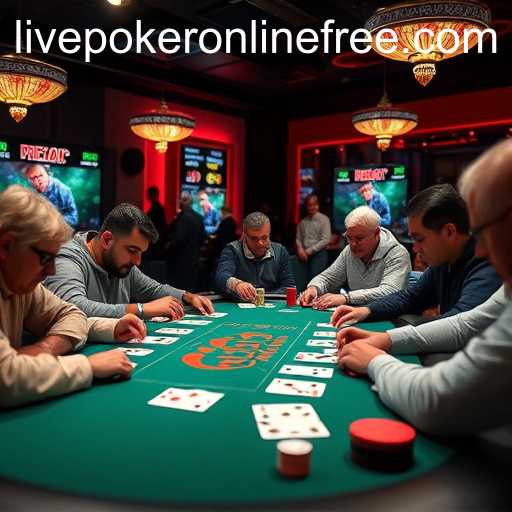
Game Rules
Understanding the Complexities of Live Poker: Rules, Strategies, and Etiquette
Why Choose Sport in Live Poker
- ⚽
Full Coverage
Follow a wide variety of sports, including football, basketball, and more.
- 📊
Detailed Statistics
Access comprehensive data to help you make informed decisions.
- 🎁
Special Promotions
Earn exclusive bonuses and participate in end-of-year offers.
Understanding the Complexities of Live Poker: Rules, Strategies, and Etiquette
- 🏆
Soccer
Watch live matches and enjoy the best betting options.
- 🏀
Basketball
Dive into the on-court action with exclusive stats and analysis.
- 🎾
Tennis
Bet on international tournaments with competitive odds.
The Resurgence of Live Poker in the Online Gaming Era
Exploring how Live Poker is thriving in the digital gaming landscape, influenced by emerging technologies and evolving player preferences.
- 📖
Study team statistics and performance before betting.
- 🕒
Gamble responsibly and set clear limits.
- 💡
Take advantage of seasonal promotions to maximize your earnings.

Game Rules

Live poker is a captivating game that blends skill, strategy, and a touch of luck, creating a thrilling experience for players around the globe. This dynamic card game, often played in casinos or private gatherings, has maintained its popularity due to its fast-paced nature and the unique set of skills required to excel. The following article explores the essential rules, strategies, and etiquette associated with live poker to help both beginners and seasoned players refine their game.
The Game Rules: Live poker involves various formats and game types, such as Texas Hold'em, Omaha, and Seven Card Stud. Despite the differences, certain universal rules apply to most versions. A typical game begins with players placing their bets—either an ante or a blind—before receiving their cards. The dealer then distributes the cards, and players engage in rounds of betting. The objective is to form the best possible hand using a combination of personal cards and community cards (in games like Texas Hold'em) or solely personal cards (as in Seven Card Stud). The player with the highest-ranking hand or the last player remaining after others have folded wins the pot.
Strategies: Live poker demands a strategic approach, blending mathematical probabilities with psychological insight. One key aspect of strategy involves understanding the odds of completing specific hands and using this data to inform betting decisions. Additionally, successful players frequently employ bluffing, attempting to deceive opponents about the strength of their hand to induce folds from stronger hands. Balancing aggression with patience is crucial, as is adapting strategies based on opponents' behaviors and tendencies observed during gameplay.
Etiquette: Equally important in live poker is the adherence to game etiquette. Players are expected to treat each other with respect, avoid 'slow rolling' (reluctantly showing the winning hand to prolong suspense), and maintain focus on the game. Understanding the importance of timely play is also vital, as excessive delays can disrupt the flow of the game. Furthermore, protecting your hand by not exposing your cards to others and abstaining from providing unsolicited advice are essential components of poker etiquette.
In conclusion, live poker is more than just a game; it's an art form that requires mastery of rules, strategies, and social interactions. By thoroughly understanding these elements, players can enhance both their enjoyment and success at the poker table.
Industry News
-

A comprehensive look at how live poker is changing with digital advancements, featuring reports on current events and future prospects.
-

Exploring the resurgence of live poker in 2025 amid technological advancements and changing player preferences.
-

Exploring the growth, technological advancements, and community dynamics of Live Poker in 2025.
-

Exploring the dynamic world of live poker in the digital age, examining current trends and future forecasts.
-

An exploration of the current state of live poker amid technological advancements and changing player dynamics in 2025.
-

As 2025 unfolds, live poker games experience a revival, blending traditional gameplay with modern technology to captivate enthusiasts worldwide.
-

Exploring the rise of live poker in the digital realm, emphasizing its impact on the gaming industry and players worldwide.
-

Explore how live poker continues to thrive amidst the rise of online gambling, with insights into current trends and the game's evolving dynamics.


